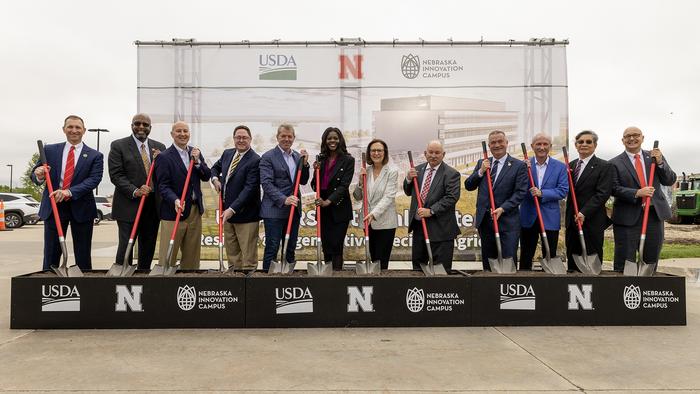USDA enters partnership to create precision agriculture research centre
- Like
- Digg
- Del
- Tumblr
- VKontakte
- Buffer
- Love This
- Odnoklassniki
- Meneame
- Blogger
- Amazon
- Yahoo Mail
- Gmail
- AOL
- Newsvine
- HackerNews
- Evernote
- MySpace
- Mail.ru
- Viadeo
- Line
- Comments
- Yummly
- SMS
- Viber
- Telegram
- Subscribe
- Skype
- Facebook Messenger
- Kakao
- LiveJournal
- Yammer
- Edgar
- Fintel
- Mix
- Instapaper
- Copy Link
Posted: 9 May 2024 | Grace Galler | No comments yet
The USDA has partnered with the University of Nebraska-Lincoln to collaborate on a “ground-breaking” precision agriculture research centre.


Image credit: Craig Chandler/University Communication and Marketing/University of Nebraska-Lincoln
The University of Nebraska-Lincoln is joining forces with the United States Department of Agriculture (USDA) to open the Construction of the National Center for Resilient and Regenerative Precision Agriculture at Nebraska Innovation Campus.
To make the launch of the Center, a ceremonial turning of dirt took place on 6 May 2024.
The research centre is a partnership between the USDA’s Agricultural Research Service, University of Nebraska–Lincoln and Nebraska Innovation Campus and is set to focus on the challenges and opportunities in agricultural innovation for the 21st century.
“There is a long history of scientific innovation and collaboration between ARS and UNL, typical of the USDA-land-grant university partnerships across the country,” commented Chavonda Jacobs-Young, USDA Chief Scientist and Undersecretary for research, education and economics.
“Updated facilities ensure our best and brightest scientists work in the environment and with the tools they need to successfully meet the challenges agriculture faces,” they continued.
In a time where AI is changing practises in the food sector and beyond, agricultural production and agricultural landscapes are also transforming. According to the team, farmers and producers need the “latest information technology, tools and data to make informed and innovative decisions for their unique operations”.
The new centre will reportedly put key research areas under the microscope to address these challenges and promote sustainable, resilient and highly efficient agriculture practices.
“This project is a testament to the long history of innovation, ingenuity and adaptability of agricultural producers across the United States and right here in Nebraska. It celebrates an incredibly productive 120-year partnership between USDA-ARS and the University of Nebraska-Lincoln, and it exemplifies the passion and dedication of agricultural, state, and federal leaders,” added Mike Boehm, Vice Chancellor for UNL’s Institute of Agriculture and Natural Resources.
“Nebraska is a special place with incredible people, and the ripples of what we do here often extend around the globe. I believe the work that will take place in this facility will usher in a new era of American agriculture, and I’m thrilled that what happens next in agriculture will happen first in Nebraska,” he continued.
The USDA is investing $160 million to establish the National Center for Resilient and Regenerative Precision Agriculture, a “state-of-the-art” laboratory. This new facility, expected to double the USDA’s scientific and support staff at the University of Nebraska–Lincoln, represents a significant expansion in agricultural research capacity.
USDA and USAID launch $1 billion programme for global food assistance
The first phase of the project will comprise 15,000 square feet of greenhouses and 10,000 square feet of headhouse space. It will also connect to the Greenhouse Innovation Center at Nebraska Innovation Campus, creating a comprehensive environment for advanced agricultural studies and innovation.
Meanwhile, the team has also disclosed that the new greenhouse space will allow ARS to perform research on wheat, barley, sorghum, forage and bioenergy grasses, and other crops. They went on to note that through research into how these plants respond to emerging pests and pathogens under a full range of environmental conditions, scientists will be “empowered” to make cutting-edge discoveries with the goal of developing climate-resilient crops for the US agriculture industry.
When fully operational, the new agricultural research complex will serve as a central hub for multidisciplinary experts, scientists, and engineers. These professionals will reportedly work closely with industry partners and producers to advance water and food security, strengthen the resilience of agricultural landscapes, and boost profitability within the agricultural sector.
“The complex problems we face today in the ag industry require unprecedented levels of collaboration to overcome. This facility will help us achieve that goal, aligning resources and magnifying impressive impacts on agriculture nationwide,” shared Chancellor Rodney D. Bennett.
“This national center will become the model for excellence in ag-focused innovation.”









